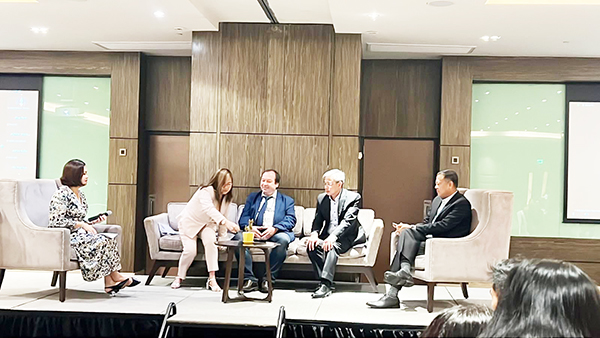CEBU CITY – The Department of Environment and Natural Resources (DENR) continues to encourage the private sector to help the government effectively enforce the Extended Producer Responsibility (EPR) law.
As part of the efforts to push for the effective implementation of the law, the DENR has partnered with Nestle Philippines in holding a series of registration and information drives.

PING Mangondo (from left) of EcoBusiness, Annaliza Teh, Undersecretary, DENR; Dr. Johannes Paul, Program Manager of GIZ; Jose Uy III, SVP and Head of Corporate Affairs of Nestlé PH, and Jonas Leones, Undersecretary, DENR, join the panel during the ‘Rethinking Plastics: EPR Paving the Way Towards Circularity’ roundtable discussion held recently in Mandaue City, Cebu. (Contributed photo)
The second leg of the “Rethinking Plastics: EPR Paving the Way Towards Circularity” roundtable discussion was held in Mandaue City, Cebu recently where the compliance and support among the private sector, especially the obliged enterprises (OEs), were highlighted.
Holding webinars and workshops with various industry associations are meant to spread awareness about the EPR law and its provisions, as well as the EPR registration process.
The DENR aims to encourage OEs to register their EPR programs with the DENR-Environmental Management Bureau (EMB) to meet the law’s required 20 percent recovery and diversion of their plastic footprint by this year.
OEs are large enterprises with total assets of over P100 million and produce, manufacture, import, or put their brand label on plastics. Micro, small and medium enterprises (MSME) are not required, but highly encouraged, to also register their EPR programs.
“We are here to assist. We have EPR clinics. We can help you on the procedures on how to register and we can guide you on the requirements of the EPR law. Together, if we can help each other, perhaps at the end of the day, we can comply with the provisions of the law,” said Undersecretary for Policy, Planning, and International Affairs Jonas Leones.
The roundtable discussion provided participants guidance on the process of registration and presented opportunities on how they can work together with the government to help in ensuring the successful implementation of the EPR Law.
EPR Registry clinics were set up by DENR, in partnership with the United Nations Development Programme (UNDP), to further assist OEs in creating and submitting their EPR programs.
Highlights from the Synthesis Report from the first EPR RTD held in Manila last May were also shared during the program, including the key takeaways and recommendations taken from the panel and roundtable discussions.
Among these are the value of data-driven measures, collaboration between the private and public sectors and among multiple stakeholders, investing in infrastructure for solid waste management and recycling, and driving consumer education when implementing the EPR Law.
After the DENR EPR campaign was launched in August, there has been an increase in EPR submissions from 667 to 709 as of mid-September.
DENR and other government partners in EPR implementation, business groups, and civil society organizations continue to proactively campaign for EPR support, recognizing that cleaning up plastic waste from the environment not only restores the planet but also protects human health, livelihoods, and food security.
The EPR education and registration drive is supported by UNDP, GIZ, the European Chamber of Commerce of the Philippines (ECCP), and Eco-Business. The third leg of the caravan will be held in Cagayan de Oro City on October 6.